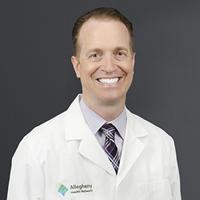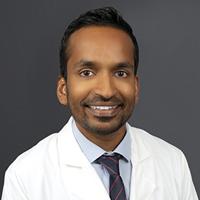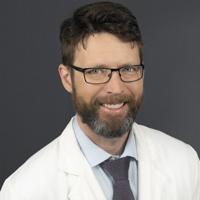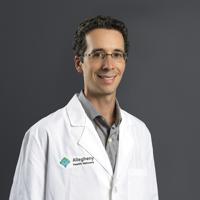Learn more about our appointment options, second opinions, locations, referrals, and resources.
AHN Atrial Fibrillation Program
AHN Atrial Fibrillation Program overview
Atrial fibrillation (AFib) happens when the heart’s upper and lower chambers beat out of sync. Although AFib is common, it can lead to serious heart conditions if left untreated. The AHN Atrial Fibrillation Program offers specialized care and effective treatment plans to help patients regain a normal heart rhythm.
Our heart rhythm specialists (electrophysiologists) offer prompt diagnosis and state-of-the-art medical and interventional therapies to treat atrial fibrillation so you can stay healthy and enjoy better quality of life. We offer new technologies, clinical trials, and advanced therapies earlier than many other centers in the country.
How we treat atrial fibrillation
Our dedicated team of atrial fibrillation specialists, including cardiac electrophysiologists, nurses, and advanced practice providers, work to provide a customized treatment plan, including the latest medical management and minimally invasive surgical procedures.
What is atrial fibrillation?
Atrial fibrillation is an irregular heart rhythm in which your heart’s chambers do not beat normally. This condition causes the upper chambers of your heart (atria) to beat out of sync with the lower chambers of your heart (ventricles). Atrial fibrillation can make you feel like your heart is fluttering or skipping a beat. If left untreated, this condition may lead to serious heart conditions, including stroke.
Risk factors for atrial fibrillation include:
- Hypertension (high blood pressure). When the force of blood (pressure) flowing through your blood vessels is consistently higher than normal. Learn more about Hypertension.
- Obesity. A complex condition that involves having abnormal or excessive amounts of body fat, which can put your health at risk. Learn more about Obesity.
- Coronary artery disease. A serious condition where the artery walls within the heart become clogged or hardened (atherosclerosis), usually developed from plaque buildup. As a result, blood flow to the heart becomes restricted, decreased, or blocked. Learn more about Coronary artery disease.
- Congestive heart failure. A serious condition in which the heart can’t pump as much blood as it should, resulting in a lack of oxygen- and nutrient-rich blood in the body’s organs. Learn more about Congestive heart failure.
- Heart valve disease. A condition that happens when one or more of the heart’s valves fail to work properly, which disrupts normal blood flow from one chamber of the heart to another. Learn more about Heart valve disease.
- Obstructive sleep apnea. A condition that happens when the flow of oxygen is blocked or obstructed when the throat muscles relax too much while sleeping. Learn more about Obstructive sleep apnea.
- Alcohol use. Drinking too much alcohol can cause significant health issues over time that impact many parts of your body.
- Being 65 years of age or older. While atrial fibrillation is a condition that can occur at any age, a diagnosis is more common in older adults.
How atrial fibrillation is diagnosed
Your physician can determine if your heart has an abnormal heartbeat by using a stethoscope to listen to your heart during a routine physical exam. If an irregular rhythm is detected, further tests may be necessary to confirm an accurate atrial fibrillation diagnosis.
These additional tests may include the following:
- Electrocardiogram. Also referred to as an ECG, an electrocardiogram is a noninvasive, painless test that uses electrodes placed on the chest to measure the heart’s electrical signals.
- A cardiac monitor. This tiny, battery-operated device is attached to a patient’s chest using an adhesive patch and records the heart’s electrical activity for 24 hours or longer. A cardiac monitor can help diagnose a variety of heart rhythm issues.
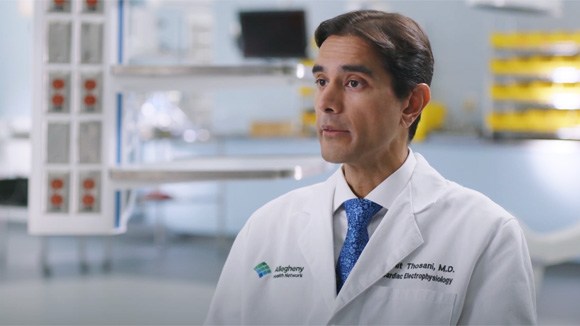
“One of the parts of our program that we’re proud of is that we are quite innovative and offer cutting-edge therapies for the treatment of atrial fibrillation and all other arrhythmias.”
Dr. Amit Thosani — Clinical Cardiac Electrophysiology
Atrial fibrillation treatment options
By taking an individualized approach to a patient’s specific needs, treatment for atrial fibrillation may include one or more of the following options:
- Medications. Used to help minimize complications, such as blood clots, and maintain a regular heartbeat.
- Cardioversion. A controlled, low-energy electrical shock sent to the heart to restore a normal rhythm.
- Ablation for atrial fibrillation. During a catheter ablation, a doctor will guide thin wire tubes (catheters) through veins or arteries toward the heart. Once in place, this minimally invasive procedure uses targeted energy signals to treat heart tissue so that it no longer beats out of rhythm.
- Cox-maze procedure. Cardiac surgeons use a scalpel to intentionally create scar tissue on your heart. They also remove the left atrial appendage, an area in the left upper chamber of the heart where patients with atrial fibrillation often form blood clots. The Cox-maze procedure can be performed during open-heart surgery or using minimally invasive techniques.
- Left atrial appendage occlusion. This procedure permanently implants a self-expanding device to close off the left atrial appendage, preventing blood clots from causing a stroke. This treatment is offered to patients who have difficulty taking blood thinners.
Innovative care
The AHN Atrial Fibrillation Program is a care referral center for all heart rhythm problems — even complex conditions that haven’t been successful with other therapies. We prioritize cutting-edge treatments and continuing innovations, including zero-to-low radiation surgical procedures, maintaining our role as a teaching site for physicians around the United States, and hosting patients from arrival through discharge — and after.
Atrial fibrillation care plan
In addition to comprehensive treatment options, new therapies, and techniques, the AHN Atrial Fibrillation care team works with other multispecialty programs to improve patients' quality of life.
AHN Center for Sleep Medicine
The AHN Center for Sleep Medicine features a complete care program for various sleep disorders like obstructive sleep apnea, insomnia, and restless legs syndrome. By providing services that include advanced testing, sleep studies, the latest treatments, and ongoing care, we can help enhance a patient’s sleep health so they can wake up refreshed.
AHN Bariatric and Metabolic Institute
Maintaining a healthy weight and body mass index is essential for heart health and quality of life. The AHN Bariatric and Metabolic Institute provides patient-centered care with a team of specialists committed to helping patients meet their health and weight loss goals. By supporting patients every step of the way — emotionally, physically, and socially — we can help you feel your best every single day.
AHN Comprehensive Hypertension Center
Although many risk factors are related to high blood pressure, immediate action can help prevent devastating organ damage or stroke. The AHN Comprehensive Hypertension Center uses guideline-directed therapies and systematic screening to help achieve blood pressure control when hypertension becomes challenging to control.
Cardiac rehabilitation
AHN's cardiac rehabilitation program helps build endurance and function through medically supervised strength training and activity. By monitoring a patient’s vital signs during each session, we can help ensure it’s safe for them to return to daily activities while considering any limitations, specific needs, and health goals.
Overall wellness
An atrial fibrillation diagnosis can be challenging to navigate. AHN offers support services such as stress management, smoking cessation, and other wellness topics to help patients along their heart health journey.
By accessing this video, I understand that I am leaving the AHN website and I will be re-directed to an external website operated by a third party platform provider. I acknowledge that the platform provider may collect personal information about me, and about the video that I view, on their platform and may use and disclose this information in accordance with its privacy policy. I agree that Allegheny Health Network is not responsible for the data collection and use practices of this third party.
Why choose us?
Atrial fibrillation can be a life-threatening condition if left untreated. An incorrect diagnosis and treatment plan can increase the risk of heart failure, heart attack, or stroke. The AHN Atrial Fibrillation Program brings together a network of specialists, dedicated social workers, and state-of-the-art tools to provide comprehensive patient care.
Efficiency
The AHN Atrial Fibrillation Program offers patients access to the latest testing, imaging, and diagnostic technologies. Our network of professionals diagnoses and interprets results across multiple platforms to provide effective services and individualized care.
Coordination
The AHN Atrial Fibrillation Program allows patients to meet with several specialists to help determine the best course of treatment for their conditions. Our team of experts reviews the diagnosis, progress, and management of atrial fibrillation while developing an atrial fibrillation care plan.
Customized treatment plans
Our specialists will create an individualized care plan for atrial fibrillation while prioritizing the patient’s quality of life. Depending on the diagnosis, a physician may suggest that a patient looks into new therapies and clinical trials.
Expertise
Our atrial fibrillation specialists include cardiac electrophysiologists, nurses, and advanced practice providers who use state-of-the-art technologies and advanced electrophysiology labs to identify and treat atrial fibrillation.
Our electrophysiology specialists include:
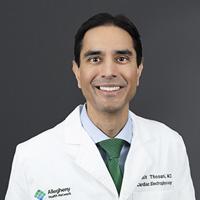
Vice Chair, AHN Cardiovascular Institute; Division Director, Electrophysiology
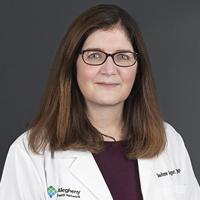
APP Supervisor, Atrial Fibrillation Program Coordinator
Hospital locations
Pittsburgh
Allegheny General Hospital
320 East North Avenue
Pittsburgh, PA 15212
GET DIRECTIONS
Forbes Hospital
2570 Haymaker Road
Monroeville, PA 15146
GET DIRECTIONS
Erie
Saint Vincent Hospital
232 West 25th Street
Erie, PA 16544
GET DIRECTIONS
Atrial Fibrillation Program appointments and information
Not yet diagnosed
If you do not have a diagnosis, call (412) DOCTORS (412) 362-8677 to make an appointment with your primary care physician (PCP). They will explore all possible causes of your symptoms.
Second opinions
If you’re looking for a second opinion, don’t hesitate to get in touch with the AHN Atrial Fibrillation Program at Allegheny General Hospital or Forbes Hospital by calling (412) 359-3457. To reach Saint Vincent Hospital, call (814) 453-7767.
Atrial fibrillation research for health care professionals
AHN Cardiovascular Research Institute
AHN's Cardiovascular Research Institute is established on more than 100 years of innovation with diverse areas of focus, including research for the latest atrial fibrillation treatments and cardiac technology. Our qualified team and atrial fibrillation specialists take pride in using new devices and medications, as well as state-of-the-art devices, technology, and therapies, to help revolutionize care for heart disease.
What is a clinical trial?
Clinical trials are unique research opportunities that explore medical treatments, strategies, or devices to ensure they’re safe and effective for humans.
Active clinical trials
By prioritizing research and innovation, our physicians and patients are engaged in more than 100 national and international clinical trials. Participating in these trials gives AHN patients special access to some of the newest treatment options for heart disease. Participation in clinical trials is based on meeting eligibility criteria.
If you’d like to learn more about eligibility requirements for a clinical trial or want to learn more about research opportunities, check out our active clinical trials.
AHN Atrial Fibrillation Program referral information for health care professionals
Refer your patient to an AHN Electrophysiology specialist
Non-AHN providers can submit an online patient referral or by calling (844) MD-REFER (844) 637-3337.
Non-AHN providers can use the EpicCare® Link™ platform to view updates on their patients’ care within AHN after the initial referral is completed.
Medical records
If you need access to specific test results or imaging not provided in the EpicCare® Link™ platform, please fill out a medical record request form.
EpicCare® is a registered trademark of Epic Systems Corporation and used with permission.
EpicCare® Link™ is a trademark of Epic Systems Corporation and used with permission.



